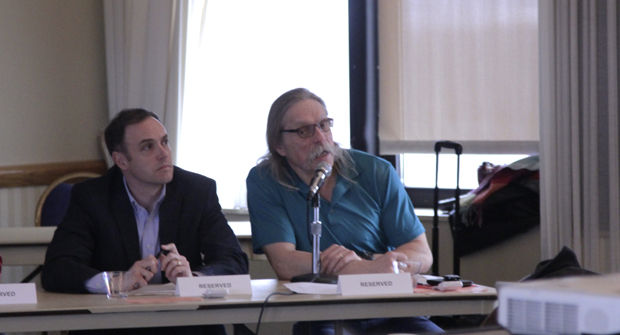Program prioritization task force increases meeting hours
Matt Streb, administrative task force co-chair, (left) and George Slotsve, academic task force co-chair, discuss the progress of NIU’s program prioritization efforts at the Faculty Senate meeting Wednesday in the Holmes Student Center, Sky Room.
March 31, 2016
The program prioritization academic task force has increased the hours it meets from four hours to eight hours every Friday for the next two weeks in order to complete their recommendations by the April 30 deadline.
Program prioritization, which began in 2014 after a recommendation from the Higher Learning Commission, uses task forces to create reports that review 223 academic programs and 236 administrative programs to influence the allocation of university funds, according to the program prioritization website.
“[An academic] program, for example, is if [a department offers] a B.A. or a B.S. or a B.A./B.S., [that] would be considered one program,” said George Slotsve, academic task force co-chair, at a Faculty Senate meeting Wednesday. “A masters, an M.E. or an M.S., would be considered another program. If you offer a Ph.D., that would be considered a third program… . You may offer a minor, that would be treated as a program.”
Administrative and academic task forces have separate grading scales and initially scored programs on quality and performance. The programs then must be placed in one of five categories: candidate for enhanced resources, no change in resources, reduced resources, transformation or subject to additional review. The goal is to equaly distribute the graded programs into each category.
The task forces have been meeting to review the program reports every Friday since Jan. 8. The administrative task force meets for approximately five hours, said Matt Streb, administrative task force co-chair.
Slotsve said task force members, on average, spend 15-30 hours a week reading 20 reports, which are usually 30 pages. Every member on the academic task force reads every report. They are currently three quarters of the way through their initial sorting and will sort through them again. At least 17 out of 21 members need to agree on the placement of the program.
The administrative task force has split up the readings into 11-member groups, in which nine need to agree on where a program will be placed and is on track to be completed by April 30, Streb said.
“There [are] two steps to the process — there is the scoring step, which helps lead to the next step, then there is the categorizing step, which is the most important thing,” Streb said.
Concerns from Faculty Senate members include the lack of transparency on the goal of program prioritization and the objectivity of the grading scale.
“It’s wonderful that you are working very hard,” said management associate professor Mahesh Subramony. “I think the key is to make sure that folks outside, such as [Faculty Senate members] and people in the campus community, have a stamp on what you are really doing. And the fact that we don’t oversell this as an objective mathematical model because… it’s essentially a way for you to make a judgement.”
Streb said the task force was not given any financial goal in grading the reports and did not create the grading scale.














